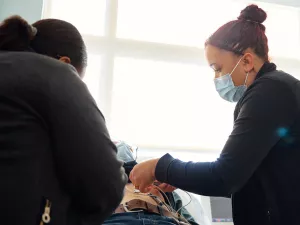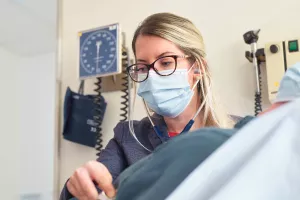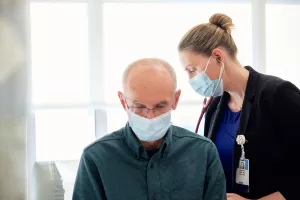Heart failure is a condition where the heart can't pump enough blood to meet the body's needs. We can treat advanced heart failure in multiple ways: with medications, electrical or valvular device implantations, a left ventricular assist device (LVAD) to aid circulation or by transplanting a healthy heart to replace your existing heart.
Failure isn’t final
Since our first heart transplant in 1985, we've been at the forefront of offering people in need of a new heart a fresh beat on life.
It’s important to know that heart failure looks different for each person because there are factors — such as underlying conditions like coronary artery disease, diabetes, high blood pressure or obesity — that can weaken the heart over time. That’s why it’s so important to keep a close pulse on your heart health.
You can trust that your personalized treatment path will place your health and wellbeing at the heart of it all.

Conditions
Nearly 1 in 4 adults in the United States will develop heart failure during their lifetime. While lifestyle factors like obesity can also lead to heart failure, certain conditions like the following can weaken the heart, too:
Heart failure symptoms
Heart failure symptoms vary based on your underlying condition and stage of heart failure. Common symptoms include:
- Arrhythmia (rapid or irregular heartbeat)
- Confusion or difficulty concentrating
- Fatigue and weakness
- Frequent urination at night
- Loss of appetite or nausea
- Persistent cough or wheezing
- Rapid weight gain
- Shortness of breath, especially with exertion or when lying down
- Struggles with exercise
- Swelling in the legs and/or abdomen
Types of heart failure
There are 3 types of heart failure, each of which is based on how your heart is pumping. Knowing what kind of heart failure you have helps us create the most effective care plan:
- Heart Failure with Reduced Ejection Fraction (HFrEF): This occurs when the main pumping chamber, the left ventricle, has an EF of 40% or less, meaning that the heart is weak in pumping blood around the body.
- Heart Failure with Mildly Reduced Ejection Fraction (HFmrEF): This occurs when the left ventricle has an EF of 41 to 49%, meaning that the pumping function is mildly reduced.
- Heart Failure with Preserved Ejection Fraction (HFpEF): This occurs when the heart is stiff and has abnormalities of relaxation, even though the pumping function (EF) is normal.
Stages of heart failure
Heart failure is a chronic condition that becomes more serious over time.
This process of understanding the extent of your heart failure is called staging, and it helps us design the most effective care plan for you. There are 4 stages of heart failure:
- Stage A: When a person is at high risk for heart failure, and doesn’t have structural heart disease or obvious symptoms
- Stage B: When a person has a heart disease, but isn’t experiencing obvious symptoms
- Stage C: When a person has a heart disease, and is experiencing heart failure symptoms
- Stage D: Also known as advanced heart failure, a person with Stage D heart failure is not tolerating or not responding well to standard medications, and may be offered advanced treatments or surgeries

Living well with heart failure
Having heart failure is tough, but people can still live full lives if they follow some simple rules. Eating healthy foods, keeping track of how you feel and doing exercises recommended by doctors can help improve your overall health and emotional well-being.
Testing
Everyone’s journey to better heart health starts with a thorough evaluation. Your doctor and cardiologist will use the latest techniques and technology to better understand your heart’s condition:
- Blood testing
- Echocardiogram (an ultrasound for the heart)
- CT scan of the chest
- Cardiac stress test
- MRI of the heart
Cath lab
A catheterization laboratory, also known as a cath lab, is a facility with specialized equipment designed specifically for evaluating serious heart and blood vessel conditions. Your doctor may send you to the cath lab for tests like:
- A coronary angiography, also known as a left heart catheterization, to examine the coronary arteries (blood vessels to the heart).
- A right heart catherization, also known as a Swan-Ganz catheter, where a small tube called a catheter is inserted into the heart to measure pressures and flows.
Right heart catheterization is a minimally invasive, catheter-based test where a small tube called a catheter is inserted into the heart to see how well it’s pumping.
Treatments
Treatments for early-stage and end-stage heart failure look a little different. We can help get a grasp on early-stage heart failure with simple lifestyle changes and medications. Treating end-stage heart failure is more involved, and may call for installing a device in your chest to aid your heart, or a heart transplant.
For people living with Stage A or Stage B heart failure, our top priority is getting you on the path to better health before symptoms begin to show. For many people, that starts with making heart-healthy lifestyle choices, like exercising more, managing your weight and having less salt in your diet.
Stopping smoking and cutting back on alcohol use does your heart a big favor, too, but that’s not always easy to do on your own. There are resources and support available to help, and we’re always here to listen if you need to talk.
Your doctor may also prescribe medication — like beta-blockers or diuretics — to slow or stop the progression of heart failure. You can learn more about heart failure medications with our handy guide, "How to Take Your Heart Failure Medicines."
For people living with Stage C or Stage D heart failure, also known as end-stage heart failure, we focus on:
- Managing symptoms
- Preventing further complications
- Helping you enjoy a comfortable quality of life
Minimally invasive treatments like lifestyle changes and medications will always be our preferred treatment approach to start with. But if those strategies aren’t enough to treat your heart failure, we’ll opt for approaches like mechanical circulatory support or a heart transplant.
People with advanced heart failure may require a mechanical device to help their hearts pump enough blood. This approach is called mechanical circulatory support, and it uses a group of ventricular assist devices (VADs) to help the heart pump blood.
Some of these tools are only meant to be used temporarily, but people living with end-stage heart failure need around-the-clock support. That’s where a VAD comes in.
A VAD is a mechanical pump that’s surgically implanted into the chest when a person’s heart function is severely impaired. VADs are powered by an electricity source from outside the body. Most of the time, VADs are implanted in the left ventricle (LVAD), which is the main pumping chamber of the heart.
Heart transplant
A cardiac transplant is a type of cardiac surgery that involves replacing a failed heart with a healthy one. It’s a serious procedure that often involves time spent on a waitlist and a long recovery time. Hearing that you need a transplant is never easy, but we have resources and support available to help you process the news and stay strong.
Who qualifies for a heart transplant?
Deciding to move forward with a heart transplant is a big decision between you, your doctor and anyone else in your support corner. You may be eligible for a heart transplant if:
- You have a heart condition that severely limits your heart's ability to pump blood.
- Your body can handle the stress of a major surgery and post-transplant treatments.
What to expect if you're undergoing a heart transplant
Undergoing a heart transplant at Tufts Medicine means you're in very safe hands. In fact, we're among the leading health systems in the country for the number of heart transplants performed each year. So when you're in need of a second chance at heart health, know that your care matters to us. Here's what to expect before, during and after a heart transplant.
If you qualify for a heart transplant, we’ll put you on the United Network for Organ Sharing (UNOS) waiting list. When we’ve found a possible match, our team will contact you immediately to begin the transplant process.
Receiving a new heart can be a life-changing procedure that will take anywhere from 6–12 hours to complete. A heart transplant involves open heart surgery, so we'll take important preparation steps to monitor your health every second of the surgery. This includes:
- Placing you under general anesthesia so you're asleep and at ease the whole time
- Hooking you up to an intravenous (IV) line so you can receive medicine and fluids
- Connecting you to catheters that will measure your important vital signs, like blood pressure, heart rate and oxygen levels
- Inserting catheters to drain your bladder and stomach during surgery
Once you're all prepped and ready to go, here's how the procedure unfolds. Your surgical team will:
- Make an incision through the breastbone, which extends from the top of the chest to just below the breasts. This is where your surgeon will work on your heart.
- Connect you to a heart-lung bypass machine. Think of this machine like a detour route: Rather than having your heart pump blood to the rest of the body, this machine puts in the work of collecting blood from your veins, adding oxygen to the blood and then circulating it through the rest of your body.
- Detach blood vessels from the diseased heart.
- Remove the diseased heart.
- Place the new heart into your chest and reattach the blood vessels.
- Kickstart blood flow to the new heart and disconnect you from the heart-lung bypass machine.
At this point in the surgery, your new heart is sewn into place. Now we need to take steps to ensure it's functioning as it should. We may need to jump-start a heart beat by giving your heart a jolt of electricity.
Your surgeons will thoroughly inspect your new heart to confirm all vessels are connected properly so there aren't any surprise leaks. Once you're good to go, the surgeon will complete the surgery by closing up the incision along your breastbone.
Recovery is a really important part of the heart transplant process. We'll want to allow the new heart space to heal, so expect to be hooked up to tubes just for a short while. These tubes will help drain blood and other fluids from around the new heart.
Once your new heart is up and pumping, we’ll have you rest in our intensive care unit (ICU) for at least 3–5 days before moving you to a regular hospital room for about 2 weeks.
After you walk out our doors, we’ll keep a close eye on your progress with routine, in-person monitoring:
- Follow-up visits monthly for the first year
- Follow-up visits every 3 months for years 1–5
- Follow-up visits every 6 months after 5 years
The immediate months following the procedure are crucial. We’ll frequently check for signs of organ rejection (your body treating your heart like it’s something to be attacked) or other complications, such as:
- Fatigue
- Fever
- Infrequent urination
- Shortness of breath
- Weight gain
We check for those signs through tests like:
- Blood work
- Echocardiograms
- Electrocardiograms
- Heart biopsies
With a new heart comes the need for a new lifestyle. Expect to make heart-healthy choices such as:
- Adhering to a strict low-bacteria diet
- Cardiac rehabilitation
- Taking immunosuppressant medications

From regular office visits to inpatient stays, find the healthcare you need and deserve close to home.

Meet the doctors and care team devoted to supporting you every step of the way along your path to better health.